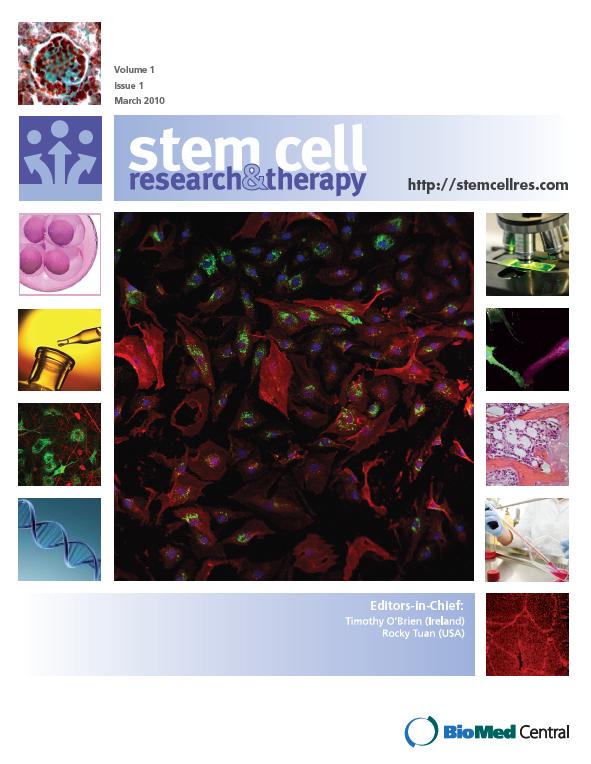在 STROMA-CoV-2 多中心随机双盲试验中用脐带间充质基质细胞治疗 COVID-19 相关性 ARDS:长期安全性、呼吸功能和生活质量
IF 7.1
2区 医学
Q1 CELL & TISSUE ENGINEERING
引用次数: 0
摘要
STROMA-CoV-2研究是法国的一项2b期、多中心、双盲、随机、安慰剂对照临床试验,该试验未发现脐带间充质基质细胞对SARS-CoV-2诱发的急性呼吸窘迫综合征患者有显著疗效。第 28 天的安全性良好。我们的扩展研究旨在评估在STROMA-CoV-2队列中使用UC-间充质干细胞6个月和12个月的安全性。我们在STROMA-CoV-2患者出院后的6个月和12个月进行了详细的多领域评估,重点关注不良事件、肺部计算机断层扫描、肺部和肌肉功能状态以及生活质量,包括与SARS-CoV-2相关的早期(< 96小时)轻度至重度急性呼吸窘迫综合征。2020 年 4 月至 2020 年 10 月期间,47 名患者入组,其中 19 人完成了为期 1 年的随访。在 6 个月和 12 个月的评估中,UC-间充质干细胞组和安慰剂组在任何终点或不良反应方面均无明显差异。有 5 名患者(26.3%)的磨玻璃不透光现象在 1 年后仍然存在。此外,虽然没有患者需要氧气或无创通气支持,但一氧化碳的扩散能力在一年内仍有变化。生活质量显示,在整个随访期间,患者的精神、情绪和身体健康状况均有所下降,在对患者进行为期一年的评估时,六分钟步行距离仍略有受损。这项研究表明,在法国第一波与SARS-CoV-2相关的中重度急性呼吸窘迫综合征病例中,静脉注射UC-间充质干细胞具有良好的安全性,1年后未观察到不良反应。本文章由计算机程序翻译,如有差异,请以英文原文为准。
Treatment of COVID-19-associated ARDS with umbilical cord-derived mesenchymal stromal cells in the STROMA-CoV-2 multicenter randomized double-blind trial: long-term safety, respiratory function, and quality of life
The STROMA-CoV-2 study was a French phase 2b, multicenter, double-blind, randomized, placebo-controlled clinical trial that did not identify a significant efficacy of umbilical cord-derived mesenchymal stromal cells in patients with SARS-CoV-2-induced acute respiratory distress syndrome. Safety on day 28 was found to be good. The aim of our extended study was to assess the 6- and 12-month safety of UC-MSCs administration in the STROMA-CoV-2 cohort. A detailed multi-domain assessment was conducted at 6 and 12 months following hospital discharge focusing on adverse events, lung computed tomography-scan, pulmonary and muscular functional status, and quality of life in the STROMA-CoV-2 cohort including SARS–CoV-2-related early (< 96 h) mild‐to-severe acute respiratory distress syndrome. Between April 2020 and October 2020, 47 patients were enrolled, of whom 19 completed a 1-year follow-up. There were no significant differences in any endpoints or adverse effects between the UC-MSCs and placebo groups at the 6- and 12-month assessments. Ground-glass opacities persisted at 1 year in 5 patients (26.3%). Furthermore, diffusing capacity for carbon monoxide remained altered over 1 year, although no patient required oxygen or non-invasive ventilatory support. Quality of life revealed declines in mental, emotional and physical health throughout the follow-up period, and the six-minute walking distance remained slightly impaired at the 1-year patient assessment. This study suggests a favorable safety profile for the use of intravenous UC-MSCs in the context of the first French wave of SARS-CoV-2-related moderate-to-severe acute respiratory distress syndrome, with no adverse effects observed at 1 year.
求助全文
通过发布文献求助,成功后即可免费获取论文全文。
去求助
来源期刊

Stem Cell Research & Therapy
CELL BIOLOGY-MEDICINE, RESEARCH & EXPERIMENTAL
CiteScore
13.20
自引率
8.00%
发文量
525
审稿时长
1 months
期刊介绍:
Stem Cell Research & Therapy serves as a leading platform for translational research in stem cell therapies. This international, peer-reviewed journal publishes high-quality open-access research articles, with a focus on basic, translational, and clinical research in stem cell therapeutics and regenerative therapies. Coverage includes animal models and clinical trials. Additionally, the journal offers reviews, viewpoints, commentaries, and reports.
 求助内容:
求助内容: 应助结果提醒方式:
应助结果提醒方式:


